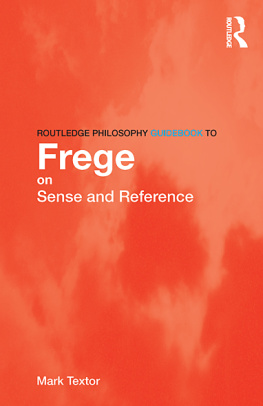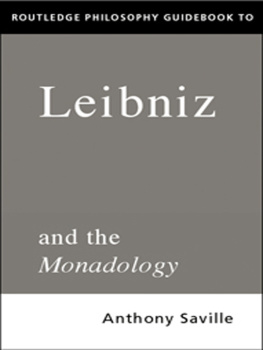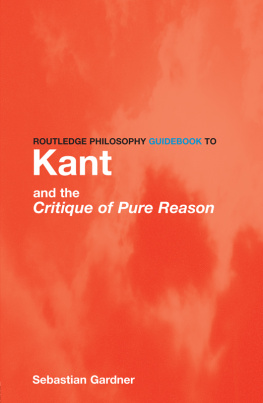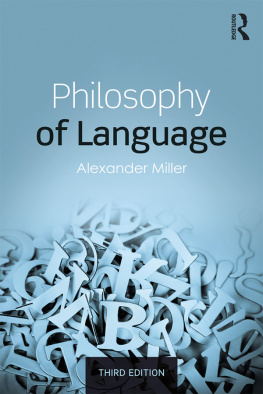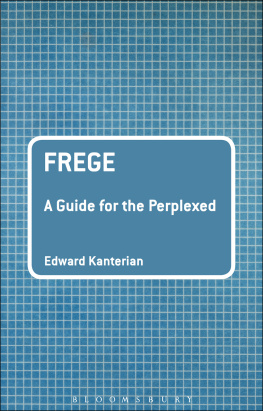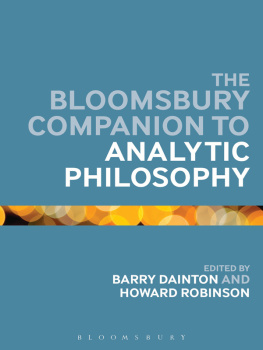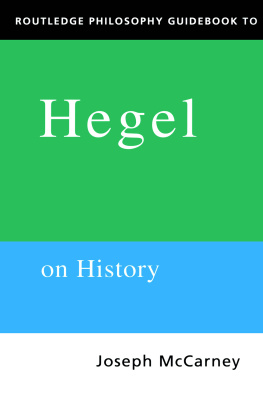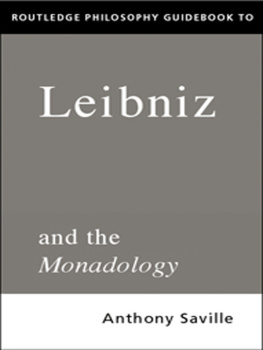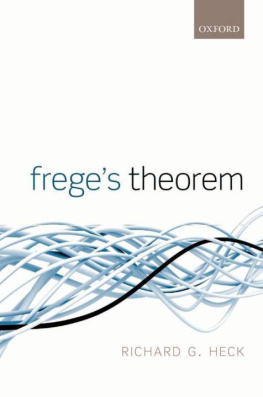Routledge Philosophy GuideBook to
Frege on Sense and Reference
Gottlob Frege (18481925) is considered the father of modern logic and one of the founding figures of analytic philosophy. He was first and foremost a mathematician, but his major works also made important contributions to the philosophy of language.
Freges writings are difficult and deal with technical, abstract concepts. The Routledge Philosophy GuideBook to Frege On Sense and Reference helps the student to get to grips with Freges thought, and introduces and assesses:
the background of Freges philosophical work
Freges main papers and arguments, focussing on his distinction between sense and reference
the continuing importance of Freges work to philosophy of logic and language.
Ideal for those coming to Frege for the first time, and containing fresh insights for anyone interested in his philosophy, this GuideBook is essential reading for all students of philosophy of language, philosophical logic and the history of analytic philosophy.
Mark Textor is a Reader in Philosophy at Kings College London, UK. His main interests are in logic and metaphysics, epistemology, philosophy of language and the history of analytic philosophy. He is editor of the The Austrian Contribution to Analytic Philosophy, also published by Routledge (2006).
ROUTLEDGE PHILOSOPHY GUIDEBOOKS
Edited by Tim Crane and Jonathan Wolff
University of Cambridge and University College London
Plato and the Trial of Socrates
Thomas C. Brickhouse and Nicholas D. Smith
Aristotle and the Metaphysics
Vasilis Politis
Rousseau and the Social Contract
Christopher Bertram
Plato and the Republic, Second Edition
Nickolas Pappas
Husserl and the Cartesian Meditations
A.D. Smith
Kierkegaard and Fear and Trembling
John Lippitt
Descartes and the Meditations
Gary Hatfield
Hegel and the Philosophy of Right
Dudley Knowles
Nietzsche on Morality
Brian Leiter
Hegel and the Phenomenology of Spirit
Robert Stern
Berkeley and the Principles of Human Knowledge
Robert Fogelin
Aristotle on Ethics
Gerard Hughes
Hume on Religion
David OConnor
Leibniz and the Monadology
Anthony Savile
The Later Heidegger
George Pattison
Hegel on History
Joseph McCarney
Hume on Morality
James Baillie
Hume on Knowledge
Harold Noonan
Kant and the Critique of Pure Reason
Sebastian Gardner
Mill on Liberty
Jonathan Riley
Mill on Utilitarianism
Roger Crisp
Wittgenstein and the Philosophical Investigations
Marie McGinn
Spinoza and the Ethics
Genevieve Lloyd
Heidegger on Being and Time, Second Edition
Stephen Mulhall
Locke on Government
D.A. Lloyd Thomas
Locke on Human Understanding
E.J. Lowe
Derrida on Deconstruction
Barry Stocker
Kant on Judgement
Robert Wicks
Nietzsche on Art
Aaron Ridley
Rorty and the Mirror of Nature
James Tartaglia
Hobbes and Leviathan
Glen Newey
Wittgenstein and the Tractatus
Michael Morris
Aristotle and the Politics
Jean Roberts
Merleau-Ponty and Phenomenology of Perception
Komarine Romdenh-Romluc
Routledge Philosophy GuideBook to
Frege on Sense and Reference
Mark Textor

LONDON AND NEW YORK
This edition published 2011
by Routledge
2 Park Square, Milton Park, Abingdon, Oxon OX14 4RN
Simultaneously published in the USA and Canada
by Routledge
270 Madison Ave, New York, NY 10016
Routledge is an imprint of the Taylor & Francis Group, an informa business
This edition published in the Taylor & Francis e-Library, 2010.
To purchase your own copy of this or any of Taylor & Francis or Routledges collection of thousands of eBooks please go to www.eBookstore.tandf.co.uk.
2011 Mark Textor
All rights reserved. No part of this book may be reprinted or reproduced or utilised
in any form or by any electronic, mechanical, or other means, now known or
hereafter invented, including photocopying and recording, or in any information
storage or retrieval system, without permission in writing from the publishers.
British Library Cataloguing in Publication Data
A catalogue record for this book is available from the British Library
Library of Congress Cataloging in Publication Data
Textor, Markus.
Routledge philosophy guidebook to Frege on sense and reference /
by Mark Textor.
p. cm. (Routledge philosophy guidebooks)
Includes bibliographical references (p. ) and index.
1. Frege, Gottlob, 18481925. 2. Sense (Philosophy)
3. Reference (Philosophy) I. Title.
B3245.F24T48 2010
193dc22
2010007852
ISBN 0-203-84590-0 Master e-book ISBN
ISBN13: 9780415419611 (hbk)
ISBN13: 9780415419628 (pbk)
ISBN13: 9780203845905 (ebk)
CONTENTS
ACKNOWLEDGEMENTS
I have given two seminars and one lecture series on Frege in Bern and Zurich. These seminars were immensely helpful in writing this book. I want to thank the participants for challenging me to explain Freges ideas, which, in turn, made me understand Frege better (I think). I am grateful to Gabriel Segal and David Papineau, my heads of department during the time I wrote this book, who supported me by granting me leave and to Andreas Graeser and Katia Saporiti for giving me the opportunity to teach in Bern and Zurich. While working on Frege, a number of talks supplied valuable feedback. I want to thank my audiences in Bern, Dublin, Geneva, Hamburg, London, Warwick and Zurich (twice). I have presented material on Frege repeatedly in the Kings Philosophy Department Staff Seminar, Oliver Blacks discussion group, the Metaphysics discussion group and the Tuesday discussion group. I am grateful to these groups for their critical input. Many people have helped me greatly by reading individual chapters or drafts and giving me detailed feedback. I want to thank Will Bynoe, John Callanan, Chris Cowie, Hanjo Glock, Fabian Gmuendner, Chris Hughes, Brian King, Dominique Kuenzle, Guy Longworth, Fraser MacBride, Christele Machut, Christian Nimtz, Benjamin Schnieder and Ulrich Stegmann. Many thanks to Alexander Davies, Tim Pritchard and Christoph Pfisterer who have read large parts of the manuscript and whose comments have helped me a lot. Many thanks also to Jessica Leech. She has read the complete first and second draft and helped me again and again to get clear about important points. I have worked with David Galloway in a weekly two-person seminar through most of the manuscript. I am grateful to David for asking me so many hard questions that resulted in changes in the book. I also want to thank Wolfgang Knne. He taught the seminar in which I first learned about Freges ideas (I hope my grasp of Freges views has improved over the years). We managed to discuss the first draft in an (almost) six-hour phone call. His comments to the manuscript prevented me from many mistakes. I am grateful to three anonymous referees whose extensive comments led to significant changes. I want to thank Tony Bruce and Katy Hamilton for support and guidance. My final thanks go to Tim Crane and Jonathan Wolff for including the book in their series.

